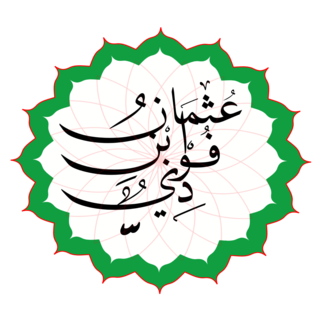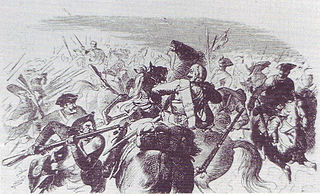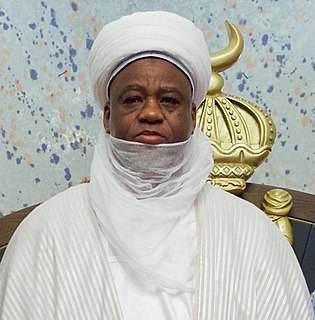Related Research Articles

Usman ɗan Fodio, was a Fulani scholar, religious teacher, revolutionary, military leader, writer, promoter of Sunni Islam, who founded the Sokoto Caliphate and ruled as its first caliph.

The Fulani War of 1804–1808, also known as the Fulani Jihad or Jihad of Usman dan Fodio, was a military conflict in present-day Nigeria and Cameroon. The war began when Usman Dan Fodiyo, a prominent Islamic scholar and teacher, was exiled from Gobir by King Yunfa, one of his former students.

The Sokoto Caliphate was a Sunni Muslim caliphate in West Africa. It was founded by Usman dan Fodio in 1804 during the Fulani jihads after defeating the Hausa Kingdoms in the Fulani War. The boundaries of the caliphate make up present-day Cameroon, Burkina Faso, Niger, and Nigeria. It was dissolved when the British and Germans conquered the area in 1903 and annexed it into the newly established Northern Nigeria Protectorate and Kamerun respectively.

Muhammad Bello was an Arab Fulani political and religious leader, who ruled as the second caliph of the Sokoto Caliphate, from 1817 until his death in 1837. He succeeded his father Usman dan Fodio, the founder and the first caliph of the Sokoto Caliphate.

The Battle of Liegnitz on 15 August 1760 saw Frederick the Great's Prussian Army defeat the Austrian army under Ernst von Laudon during the Third Silesian War.

The Battle of Muret, fought on 12 September 1213 near Muret, 25 km south of Toulouse, was the last major battle of the Albigensian Crusade and one of the most notable pitched battles of the Middle Ages. Although estimates of the sizes of the respective armies vary considerably even among distinguished modern historians, it is most well known for a small force of French knights and crusaders commanded by Simon de Montfort the Elder defeating a much larger allied army led by King Peter II of Aragon and Count Raymond VI of Toulouse.
Yunfa was a king of the Hausa city-state of Gobir in what is now Nigeria. He is particularly remembered for his conflict with Islamic reformer Usman dan Fodio.

Gobir was a city-state in what is now Nigeria. Founded by the Hausa in the eleventh century, Gobir was one of the seven original kingdoms of Hausa land, and continued under Hausa rule for nearly seven hundred years. Its capital was the city of Alkalawa. In the early 19th century elements of the ruling dynasty fled north to what is today Niger from which a rival dynasty developed ruling as Sarkin Gobir at Tibiri. In 1975 a reunited traditional sultanate took up residence in Sabon Birni, Nigeria.
Degel is a town in northern Nigeria. Once a part of the Hausa city-state of Gobir, Degel is particularly noted for being the home of Fulani Islamic reformer Usman dan Fodio from 1774 to 1804. Dan Fodio built a large following in the area until, fearing his growing power, Yunfa of Gobir ordered him and his followers into exile, triggering the Fulani War.
Alkalawa was the capital of the Hausa city-state of Gobir, in what is now northern Nigeria.

Muhammadu Sa'ad Abubakar, CFR is the 20th Sultan of Sokoto. As Sultan of Sokoto, he is considered the spiritual leader of Nigeria's Muslims, roughly fifty percent of the nation's population.
Abdullahi dan Fodio, Amir of Gwandu (1819–1828), was a scholar and brother of Usman dan Fodio (1754–1817). Usman, being more of a scholar than politician, delegated the practical regency of the western part of his empire to Abdullahi, who later became the Emir of Gwandu, and the eastern part to his son Muhammed Bello. The title of sultan was passed on to Bello. 1815.

Ali Babba bin Bello was the fourth caliph of the Sokoto Caliphate from 1842 to 1859. The Sokoto Caliphate leaders are partly Arabs and partly Fulani as stated by Abdullahi dan Fodio, brother of Usman dan Fodio who claimed that their family are part Fulani, and part Arabs, they claimed to descent from the Arabs through Uqba ibn Nafi who was an Arab Muslim of the Umayyad branch of the Quraysh, and hence, a member of the family of the Prophet, Uqba ibn Nafi allegedly married a Fulani woman called Bajjumangbu through which the Torodbe family of Usman dan Fodio descended. Caliph Muhammed Bello writing in his book Infaq al-Mansur claimed descent from Prophet Muhammad through his paternal grandmother's lineage called Hawwa, Alhaji Muhammadu Junaidu, Wazirin Sokoto, a scholar of Fulani history, restated the claims of Shaykh Abdullahi bin Fodio in respect of the Danfodio family been part Arabs and part Fulani, while Ahmadu Bello in his autobiography written after independence replicated Caliph's Muhammadu Bello claim of descent from the Arabs through Usman Danfodio's mother, the historical account indicates that the family of Shehu dan Fodio are partly Arabs and partly Fulani who culturally assimilated with the Hausas and can be described as Hausa-Fulani Arabs. Prior to the beginning of the 1804 Jihad the category Fulani was not important for the Torankawa (Torodbe), their literature reveals the ambivalence they had defining Torodbe-Fulani relationships. They adopted the language of the Fulbe and much ethos while maintaining a separate identity. The Toronkawa clan at first recruited members from all levels of Sūdānī society, particularly the poorer people. Toronkawa clerics included people whose origin was Fula, Wolof, Mande, Hausa and Berber. However, they spoke the Fula language, married into Fulbe families, and became the Fulbe scholarly caste. Ali bin Bello is known by a variety of different names in different sources, including: Ali bin Bello, Aliyu Babba, and Mai Cinaka.

The Battle of Heliopolis was an engagement that pitted the French Armée d'Orient under General Kléber against a British-supported Ottoman army at Heliopolis on 20 March 1800.
The Kontagora Emirate is a traditional state with the capital city of Kontagora, Niger State, Nigeria. The Kontagora Emirate is among the major emirates in Niger state like Kagara Emirate, Suleja Emirate and others
The Battle of Arelate was fought in 458 near Arelate (Arles) between Western Roman Emperor Majorian and Visigothic king Theodoric II. After the assassination of Flavius Aetius in 454, the Visigoths began to expand their kingdom at the expense of the crumbling Roman administration in Gaul and Hispania. When Majorian became emperor in 457, the Visigoths under king Theodoric II had just recently defeated the Suebic Kingdom in north-west Hispania and were consolidating their hold on the rest of the peninsula.

Ahmadu Atiku also known as Ahmadu Zarruku was Sultan of Sokoto from 1859 to 1866. Prior to becoming Sultan, he was head of the Abu Bakr Atiku branch of Uthman Dan Fodio's family and held the title of Sarkin Zamfara with responsibilities for Sokoto town and south-east Sokoto. Atiku established the military settlement (ribat) at Chimmola which was across the valley from the town of Wurno and which he used as the seat of government.
Umaru Nagwamatse Dan Abu Bakar was a prince from the Sokoto Caliphate, he was a grand son of Usman dan Fodio and the founder of Kontagora Emirate.The Sokoto Caliphate leaders are partly Arabs and partly Fulani as stated by Abdullahi dan Fodio, brother of Usman dan Fodio who claimed that their family are part Fulani, and part Arabs, they claimed to descent from the Arabs through Uqba ibn Nafi who was an Arab Muslim of the Umayyad branch of the Quraysh, and hence, a member of the family of the Prophet, Uqba ibn Nafi allegedly married a Fulani woman called Bajjumangbu through which the Torodbe family of Usman dan Fodio descended. Caliph Muhammed Bello writing in his book Infaq al-Mansur claimed descent from Prophet Muhammad through his paternal grandmother's lineage called Hawwa, Alhaji Muhammadu Junaidu, Wazirin Sokoto, a scholar of Fulani history, restated the claims of Shaykh Abdullahi bin Fodio in respect of the Danfodio family been part Arabs and part Fulani, while Ahmadu Bello in his autobiography written after independence replicated Caliph's Muhammadu Bello claim of descent from the Arabs through Usman Danfodio's mother, the historical account indicates that the family of Shehu dan Fodio are partly Arabs and partly Fulani who culturally assimilated with the Hausas and can be described as Hausa-Fulani Arabs, Prior to the beginning of the 1804 Jihad the category Fulani was not important for the Torankawa (Torodbe), their literature reveals the ambivalence they had defining Torodbe-Fulani relationships. They adopted the language of the Fulbe and much ethos while maintaining a separate identity.
Saude Abdullahi-Aliyu born in 1952, is a princess of the Fulani royal family of Wudil, a Nigerian educator and farmer, she is the first woman of Kano State descent to hold the position of a Federal Principal and a Federal Director of Education at the Federal Ministry of Education and the first Woman University graduate from Wudil Local Government of Kano State in North-West, Nigeria. She held the position of President Muslim Students Society of Nigeria at Women Teachers College, Kano.
References
- ↑ Spencer C. Tucker (23 December 2009). A Global Chronology of Conflict: From the Ancient World to the Modern Middle East [6 volumes]: From the Ancient World to the Modern Middle East. ABC-CLIO. pp. 1037–. ISBN 978-1-85109-672-5.
- ↑ Scott E. Hendrix; Uchenna Okeja (1 March 2018). The World's Greatest Religious Leaders: How Religious Figures Helped Shape World History [2 volumes]. ABC-CLIO. pp. 188–. ISBN 978-1-4408-4138-5.
- ↑ Falola, Toyin; Genova, Ann; Heaton, Matthew M. (2018-06-21). Historical Dictionary of Nigeria. Rowman & Littlefield. ISBN 978-1-5381-1314-1.
- ↑ Robert Sydney Smith (1989). Warfare & Diplomacy in Pre-colonial West Africa. Univ of Wisconsin Press. pp. 34–. ISBN 978-0-299-12334-5.
- ↑ Spencer C. Tucker (2009). A Global Chronology of Conflict: From the Ancient World to the Modern Middle East [6 volumes]. ABC CLIO. p. 1037. ISBN 978-1-85109-672-5 . Retrieved November 19, 2014.
- "Usman dan Fodio." Encyclopædia Britannica Online.